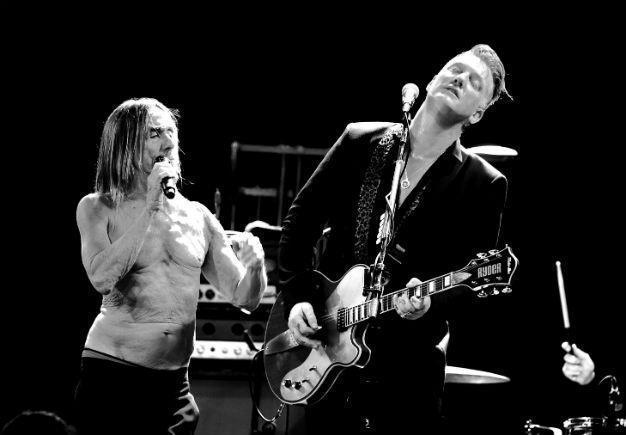On possible finale, punk icon Iggy Pop looks back darkly
NEW YORK - Agence France-Presse

AFP photo
Iggy Pop, struggling to kick a heavy drug habit in the late 1970s, celebrated his own intensity with the song that was arguably his masterpiece, "Lust for Life."
On what he hints will be his final album, the now 68-year-old punk icon has offered a bleak mirror vision as he sizes up the riches of the modern world and shrugs it off.
"When your love of life is an empty beach, don't cry," he sings on one track of "Post Pop Depression," which comes out on March 18.
"Post Pop Depression" -- its title an intriguing double entendre by Pop, who was born in Michigan as James Osterberg -- marks the latest bid by a music legend to create a definitive album as a final statement.
British legend David Bowie -- Pop's friend and mentor who worked with him on "Lust for Life" and the American rocker's solo debut "The Idiot" -- in January came out with an intricate reflection on his own mortality, "Blackstar," two days before his death from an undisclosed battle with cancer.
Pop -- despite his craggy appearance and years of hard living, which famously included concerts in which he would roll about in broken glass -- is not known to be ill and has scheduled a tour of mid-sized theaters around North America and Europe.
But "Post Pop Depression," Pop's 22rd album if you include work with his early band The Stooges, unmistakably looks large at the rocker's legacy.
Pop sings longingly for a voluptuous former lover on "Gardenia" and reminisces of his artistically rejuvenating years in Berlin with Bowie on "German Days."
The final track, "Paraguay," takes the South American country as a metaphor for a fresh escape -- away from First World lifestyle of incessant online jabbering and suffocating social codes.
"I'm going where sore losers go / To hide my face and spend my dough," Pop sings.
In a classic Pop buildup that takes on the air of jam poetry, the artist who once said that he wanted to be your dog shouts: "I want to be your basic clod who made good / And went away while he could / To somewhere where people are still human beings."
The ever chameleonic Bowie introduced Pop to electronic elements but the American rocker was never as consistently experimental, preferring the raw passion of punk.
Pop found an apt partner for "Post Pop Depression" in guitarist Josh Homme of Queens of the Stone Age, a signature force behind the California desert rock movement that focuses on ragged, bluesy guitar rather than studio smoothness.
Homme also completed the "Post Pop Depression" in a spirit of darkness as he is a co-founder of Eagles of Death Metal, the band whose concert in Paris was massacred by Islamic State extremists on November 13, although Homme was not present.
Pop said he reached out to Homme in the form of an unsolicited package of handwritten notes -- which included graphic descriptions by Pop of his sex life -- and the inter-generational pair eventually agreed to play together in secrecy.
Pop brought in other hard-charging rockers -- Queens of the Stone Age bassist Dean Fertita and drummer Matt Helders of Arctic Monkeys.
"Post Pop Depression" heads into a subtle dance beat on "Sunday" and brings in Native American-inspired drums on "Vulture," but Pop largely sticks to his signature form of sweaty rock bursts.
Pop already had his chances to explore musical frontiers. In his most innovative work, Pop played with jazz on 2009's "Preliminaires" which was inspired by a novel by provocative French writer Michel Houellebecq.
The punk icon also released an album of cover songs, most in French, in 2012 and has recorded two albums with The Stooges since they reunited a decade ago.
Yet experimental final albums can backfire. Lou Reed, who died in 2013, was universally heralded for the artistic sense he brought to rock yet was widely panned for his last album, "Lulu," a collaboration with Metallica.
On "Post Pop Depression," Pop looks back musically but also to the beyond. On "American Valhalla," the title a reference to the paradise of Norse mythology, Pop wonders what lies next.
"Death is the pill that's hard to swallow," he sings. "Is anybody in there? And can I bring a friend?"
